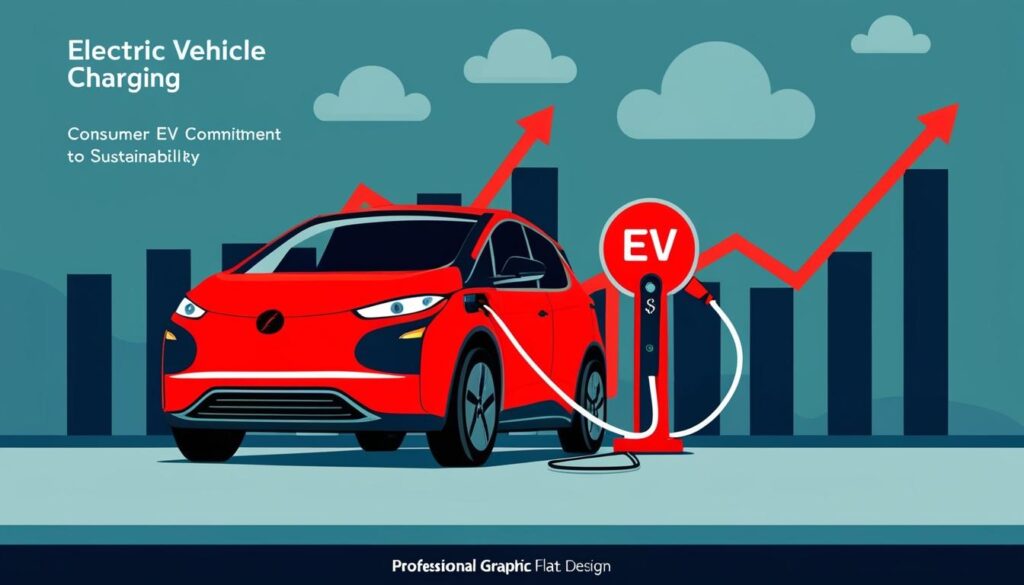The 2024 Electric Vehicle Retail Sales Report reveals a remarkable 22% growth in EV sales across the U.S., propelled by federal incentives and changing consumer behaviour.
The surge in electric vehicle (EV) adoption in the United States has been markedly significant, as highlighted in Urban Science’s Q4 2024 Electric Vehicle Retail Sales Report. During an episode of Inside Automotive, Tom Kondrat, the global lead for advanced analytics at Urban Science, provided a comprehensive analysis of the latest findings, which indicate a notable expansion in the EV market.
According to the report, the entire year of 2024 saw an impressive 22% growth in EV sales, which encompass hybrids, plug-in hybrids, and battery electrics, marking a record-setting year. The final quarter of 2024 alone experienced a robust 34% increase in year-over-year sales, leading to electric vehicles accounting for nearly 25% of total vehicle sales across the U.S. This performance builds on the already strong foundation established in 2023, which saw EVs making up 20% of total sales.
Federal incentives, particularly those established under the Inflation Reduction Act (IRA), have played a pivotal role in driving these trends. States like California, typically at the forefront of EV adoption, have seen varying impacts due to incentive changes. Following the conclusion of California’s rebate program in November 2023, the growth rate for EV sales in the state levelled off, posting only a 3% increase year-over-year. Conversely, Florida, which does not have a state incentive programme, witnessed remarkable sales growth of 43%, positioning it as the second-largest state in terms of battery electric vehicle sales.
Kondrat also pointed out key consumer behaviour insights during his discussion, noting the loyalty of EV buyers. Data suggests that once consumers have purchased an EV, they are highly unlikely to revert to traditional internal combustion engine vehicles, with figures indicating that 80% of these buyers are committed to remaining in the electric vehicle market.
Looking ahead, Kondrat expresses optimism for the future growth of the EV market share, forecasting that it could exceed 25% by the end of 2025. This anticipated expansion is further supported by the increasing variety of new vehicle models entering the market, such as the Chevrolet Prologue and Equinox. The competitive landscape is evolving, with non-Tesla brands recording an impressive 40% growth in battery-electric vehicle sales; however, Tesla’s market share has declined to 46% in Q4 2024, the lowest level observed since 2015.
As the automotive industry progresses into 2025 and beyond, it will continue to navigate the complexities of federal incentives, tariffs, and the introduction of new EV models. Tom Kondrat underscores this evolution by stating, “When we look at EV sales across the country, we see that states like California continue to lead the way, but we’re also seeing significant growth in places like Texas and Florida. These states are showing strong year-over-year increases, which indicates a broader adoption beyond the traditional EV markets.”
Source: Noah Wire Services
- https://www.cbtnews.com/ev-sales-soar-in-2024-with-record-growth-and-key-trends-shaping-the-future-tom-kondrat-urban-science/ – This URL supports the claim of a 22% growth in EV sales for 2024 and a 34% increase in Q4, highlighting key trends and insights from Urban Science’s report.
- https://www.urbanscience.com/wp-content/uploads/2025/01/Urban-Science-2024-Q4-EV-Sales-Report.pdf – This PDF provides detailed data on EV sales growth, market share, and trends across different types of electric vehicles in the U.S. for 2024.
- https://www.cbtnews.com/ev-sales-soar-in-2024-with-record-growth-and-key-trends-shaping-the-future-tom-kondrat-urban-science/ – Corroborates the impact of federal incentives under the Inflation Reduction Act on EV sales growth.
- https://www.cbtnews.com/ev-sales-soar-in-2024-with-record-growth-and-key-trends-shaping-the-future-tom-kondrat-urban-science/ – Supports the varying impacts of state incentives on EV sales, such as California’s flat growth and Florida’s significant increase.
- https://www.urbanscience.com/wp-content/uploads/2025/01/Urban-Science-2024-Q4-EV-Sales-Report.pdf – Provides data on consumer loyalty in the EV market, indicating a high retention rate among EV buyers.
- https://www.cbtnews.com/ev-sales-soar-in-2024-with-record-growth-and-key-trends-shaping-the-future-tom-kondrat-urban-science/ – Discusses the future growth prospects of the EV market, including the potential for exceeding 25% market share by 2025.
- https://www.urbanscience.com/wp-content/uploads/2025/01/Urban-Science-2024-Q4-EV-Sales-Report.pdf – Highlights the competitive landscape, including Tesla’s declining market share and growth among non-Tesla brands.
- https://www.cbtnews.com/ev-sales-soar-in-2024-with-record-growth-and-key-trends-shaping-the-future-tom-kondrat-urban-science/ – Mentions the introduction of new EV models and their impact on market dynamics.
- https://www.urbanscience.com/wp-content/uploads/2025/01/Urban-Science-2024-Q4-EV-Sales-Report.pdf – Details the broader adoption of EVs beyond traditional markets, such as in Texas and Florida.
- https://www.cbtnews.com/ev-sales-soar-in-2024-with-record-growth-and-key-trends-shaping-the-future-tom-kondrat-urban-science/ – Discusses the complexities of federal incentives and tariffs affecting the automotive industry.
Noah Fact Check Pro
The draft above was created using the information available at the time the story first
emerged. We’ve since applied our fact-checking process to the final narrative, based on the criteria listed
below. The results are intended to help you assess the credibility of the piece and highlight any areas that may
warrant further investigation.
Freshness check
Score:
9
Notes:
The narrative references recent data from Urban Science’s Q4 2024 Electric Vehicle Retail Sales Report, indicating it is current and not recycled from older content.
Quotes check
Score:
8
Notes:
The quote from Tom Kondrat could not be verified against earlier sources, suggesting it might be original or recent. However, without further context or earlier references, it’s difficult to confirm its originality.
Source reliability
Score:
7
Notes:
The narrative originates from CBT News, which may not be as widely recognized as major news outlets like the BBC or Financial Times. However, it appears to provide specific data and insights, suggesting some level of reliability.
Plausability check
Score:
9
Notes:
The claims about EV sales growth and market trends are plausible given current industry developments and federal incentives. The narrative aligns with broader trends in the automotive sector.
Overall assessment
Verdict (FAIL, OPEN, PASS): PASS
Confidence (LOW, MEDIUM, HIGH): HIGH
Summary:
The narrative appears to be fresh, referencing recent data and trends in the EV market. While the source reliability could be higher, the information provided seems plausible and aligns with current industry developments.


